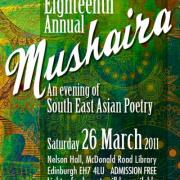
The Urdu Society of Scotland will host its 18th annual Mushaira at McDonald Road Library later this month. Spurtle spoke to organiser Tariq Muneer – Professor of Energy Engineering at Napier University – in an effort to begin understanding this successful, but comparatively little known, cultural happening in Broughton's midst.
In the Urdu-speaking culture of northern India and Pakistan, the Mushaira is a gathering at which poets perform their own works. As a rule of thumb, poems – traditionally in the form of the 'ghazal' – are invited to be recited or sung, and often provoke appreciative repetition of couplets by the audience. Those present in the audience may volunteer to perform their own works; however, it is usually an honoured guest who has the privilege of performing last. The Mushaira is itself a classical form, which need not be distinguished from the poems performed as part of it.
The Broughton event will comprise two 2-hour sessions, the first chaired by 'Lady' Rahat and dealing with the traditional subject matter of Love. This may mean either love of the Almighty, or love for a member of the opposite sex. In fact, much of this poetic discipline's wit, interest and charm lies in such artful ambiguity. 'Lady' Bushra will chair the second session, this one focusing on humour in poetry.
Both chairwomen are themselves accomplished writers, who will use their personal expertise to understand and manage an audience of around 40 people (including perhaps 15 other poets, some of them – like Mr Gohar – well-known) from as far afield as Glasgow. Poets – even poets being humorous – take their craft seriously, and formal dress at the Mushaira reflects this. However, the atmosphere is relaxed and family-friendly, with refreshments freely available.
Informality, flexibility, a playfulness of thought and word are encouraged within the procedural bounds of the Mushaira, and this perhaps helps to explain the continuing popularlty of the form across generations. Today's young Urdu poets here find space to address modern issues: the challenges of life in Scotland, for example, and domestic and international political issues.
Professor Muneer admires Urdu poetry's capacity to transcend national and cultural frontiers. Two of his favourite writers are the celebrated early to mid-20th century Iqbal (resident in Germany and interested in the work of Kant and Hegel) and Faiz (a socialist poet who lived into the mid-1990s under the ambit of the Soviet Union, married to an English academic).
Spurtle realises that we have merely scratched the surface of this subject, and quite possibly muddied its waters in the process, but it seemed a worthwhile exercise not least because Professor Muneer so obviously welcomes increased interest from both within and outwith the Urdu-speaking community. He is also appreciative of long-term support from CEC's Head of Libraries and Information Services Liz McGettigan, and keen to point out that – thanks to her and colleagues' efforts – many excellent Urdu poets' works are stocked by the McDonald Road branch itself.
The 18th annual Mushaira will run from 6–10pm on 26 March, in the Nelson Hall, McDonald Road Library. Entry is free.